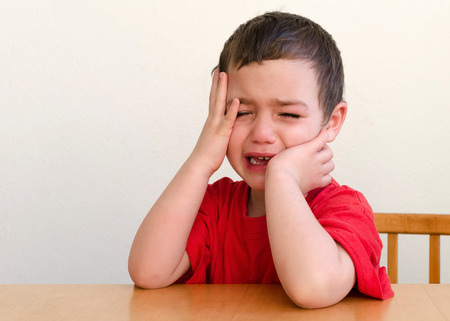
Though it’s comforting to believe that your child will outgrow those “terrible two” tantrums by their third birthday, the truth is more complicated. Even if you’ve worked hard to help your child identify and understand their emotions, communicate better, and you strive to avoid trigger situations, an occasional tantrum is likely to erupt even through the early school years.
So how do you manage an older child’s outbursts?
Preschoolers Push Limits
Children between the ages of 3 and 6 are more keenly attuned to their emotions and far better communicators than their younger siblings. But they’re also at the mercy of competing developmental urges: They want to explore the greater world, but they also fear separation from the comforts of home and family.
Most tantrums thrown by older children generally occur for two reasons. First, when they feel that their independence is curtailed; and second, when they’re exerting their own will and testing the limits of your rules. When you add frustration, hunger, or fatigue to the mix, the result can be explosive.
Parents Practice Patience
It’s difficult to be patient when your older child is putting on a public show of bad behavior, but reacting angrily to a tantrum often escalates the problem. Consider the following responses:
- Remain calm at all times
- If necessary, remove your child and yourself from the public area
- If possible, bring your child to a quiet, private space
- Consider if there is a physical aspect to the tantrum. Is your child hungry? Overtired? Feeling pressured?
- Consider if there is particular stress in his or her life that is triggering this tantrum, such as a drastic change in routine, trouble in the family or school, etc.
- Hug him if he’ll let you
- Don’t cave to his demands immediately, else you’ll teach him that having a tantrum will get him what he wants
- Once he is calm, acknowledge his anger and frustration. See if he can put his own feelings into words
- If the tantrum was due to hunger or fatigue, give him a snack and some rest
- If the tantrum is a sign of general stress, consider ways to mitigate the situation
- If the tantrum was due to his bid for more independence, consider, in the future, offering him proscribed choices, such as letting him choose one of two possible lunches (if the tantrum was about food)
- If the tantrum was about defiance, such as not wanting to leave the playground or friend’s house, consider, in the future, giving him a heads-up about transitions, such as “we’re leaving in ten minutes (five minutes…two minutes) to pick up your brother.”
Tantrums are a normal part of a young child’s development. But if your child’s outbursts are growing in severity or frequency, or he or she begins to harm himself or others, it’s a good idea to talk about the problem with your pediatrician to rule out a more serious issue.





















